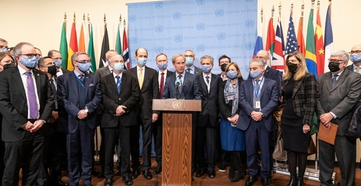Russia’s invasion of Ukraine brings anti-money laundering into sharp focus

Since Russia’s invasion of Ukraine in late February, the attention paid to law firms’ compliance with anti-money laundering (AML) regulations has increased. Some firms have been criticised for their connections to oligarchs – powerful, wealthy businessmen and women close to the Kremlin. A significant tightening of regulations seems inevitable.
In a debate on Ukraine in the UK’s House of Lords, Lord Carlile QC said it was ‘probably fair to say that there is a host of law firms that have been involved’ in helping Russians launder money. According to anti-corruption group Transparency International, £6.7bn in ‘questionable funds’ from around the world are currently invested in UK property. It’s not for nothing that London is often described as the ‘money laundering capital of the world’.
In the UK’s House of Commons, Member of Parliament Bob Seely alleged that whistle-blowers working for big law firms had told him that they do not do proper client checks and that ‘know your client’ systems were ‘non-existent’. He added: ‘Some actually have a list of people that they specifically do not do those checks on because they know that they are inherently corrupt and inherently criminal.’
A spokesperson for the Solicitors Regulation Authority (SRA) of England and Wales told Global Insight that the ‘Solicitors and the firms we regulate must be fully committed to preventing money laundering. These are serious allegations. We are writing to Bob Seely to understand the detail behind them. We will take action if we find evidence of wrongdoing.’
The situation is now highly charged and changing every day, with a host of new legislation being promised. Many governments have imposed sanctions on Russian individuals such as Roman Abramovich, owner of the English football club Chelsea.
In the UK, major Russian banks have been excluded from the financial system, while all Russian banks are to have their assets frozen. The Russian State and major companies will not be able to raise finance or borrow money on UK markets, and a limit will be placed on the deposits Russians can make at UK banks.
The prospect of enforcement action, including criminal prosecution, against individuals is very real now
Peter Binning
Member, IBA Anti-Money Laundering Legislation Implementation Group
In early March, the SRA updated its guidance for law firms on ensuring they’re adhering to government sanctions on Russian nationals and organisations. ‘Your firm must have appropriate policies in place to ensure you comply with sanctions legislation, including carrying out regular and appropriate checks of sanctions lists,’ it says. ‘We expect you to take your responsibilities under the regime to safeguard the UK and protect the reputation of the legal services industry seriously.’
AML advice is now also extremely prominent on the Law Society of England and Wales website.
Even prior to Russia’s invasion of Ukraine, regulators were already toughening their stance on AML rules for law firms. In January, a prominent London law firm was fined a record amount for committing ‘serious breaches’ of the UK’s AML regulations. The firm agreed to pay a fine of £232,500, plus a further £50,000 towards the SRA investigation costs. ‘The admitted technical breaches were related primarily to risk assessment, customer due diligence, anti-money laundering training and requirements relating to client and firm funds. Categorically – no money laundering took place,’ a spokesperson for the firm told Global Insight.
Stephen Revell is the Co-ordinator of the IBA Anti-Money Laundering Legislation Implementation Group and has been at the forefront of discussions between the IBA and the Financial Action Task Force, an intergovernmental organisation that develops policies to combat money laundering. ‘The SRA’s fine was a strong illustration of the need for law firms to not only have a strong and clear policy with regard to due diligence around clients to ensure that law firms are not being used for money laundering but also the importance of adhering to that policy and good record-keeping,’ Revell tells Global Insight. ‘Law firms, and not just those in the UK, should definitely be reviewing their approach to compliance with anti-money laundering regulations.’
It’s not just law firms who need to be paying attention. In December 2021, UK bank NatWest was fined £264.8m for three offences of failing to comply with money laundering regulations.
This marked the first time that regulator the Financial Conduct Authority (FCA) has pursued criminal charges for money laundering failings. ‘Although in no way complicit in the money laundering which took place, without the bank’s failures, the money could not be effectively laundered,’ said the judge in the NatWest case.
There’s no doubt that the UK AML regime now has sharper enforcement teeth as a result of recent activity by the FCA and the professional regulators, says Peter Binning, a partner at Corker Binning and also a Member of the IBA Anti-Money Laundering Legislation Implementation Group. ‘Compliance officers, professional advisors, senior managers and board directors with risk and compliance responsibilities need to take notice,’ he says. ‘The prospect of enforcement action, including criminal prosecution, against individuals is very real now. The deterrent effect of prosecuting individuals is far, far higher than extracting large fines from companies, even in corporate plea deals like the NatWest case.’
Binning says there will be more of these cases, not just in the UK but in the US and other countries as well, particularly as global geopolitical tensions continue to build in relation to Russia and China. ‘The East/West standoff also brings sanctions centre stage which carry with them further risk for the professional advisor and the regulated financial sectors around the world,’ he says.




